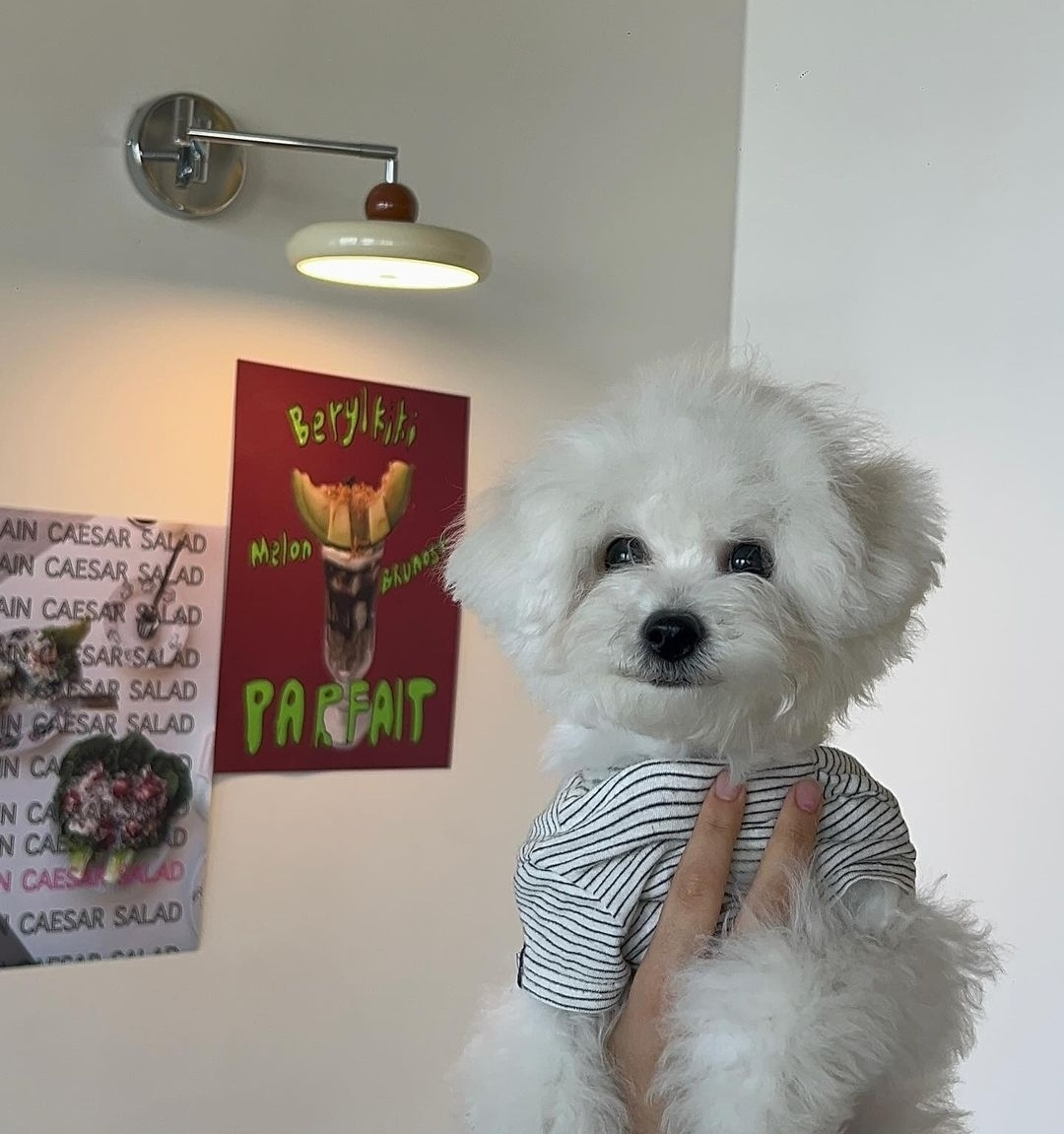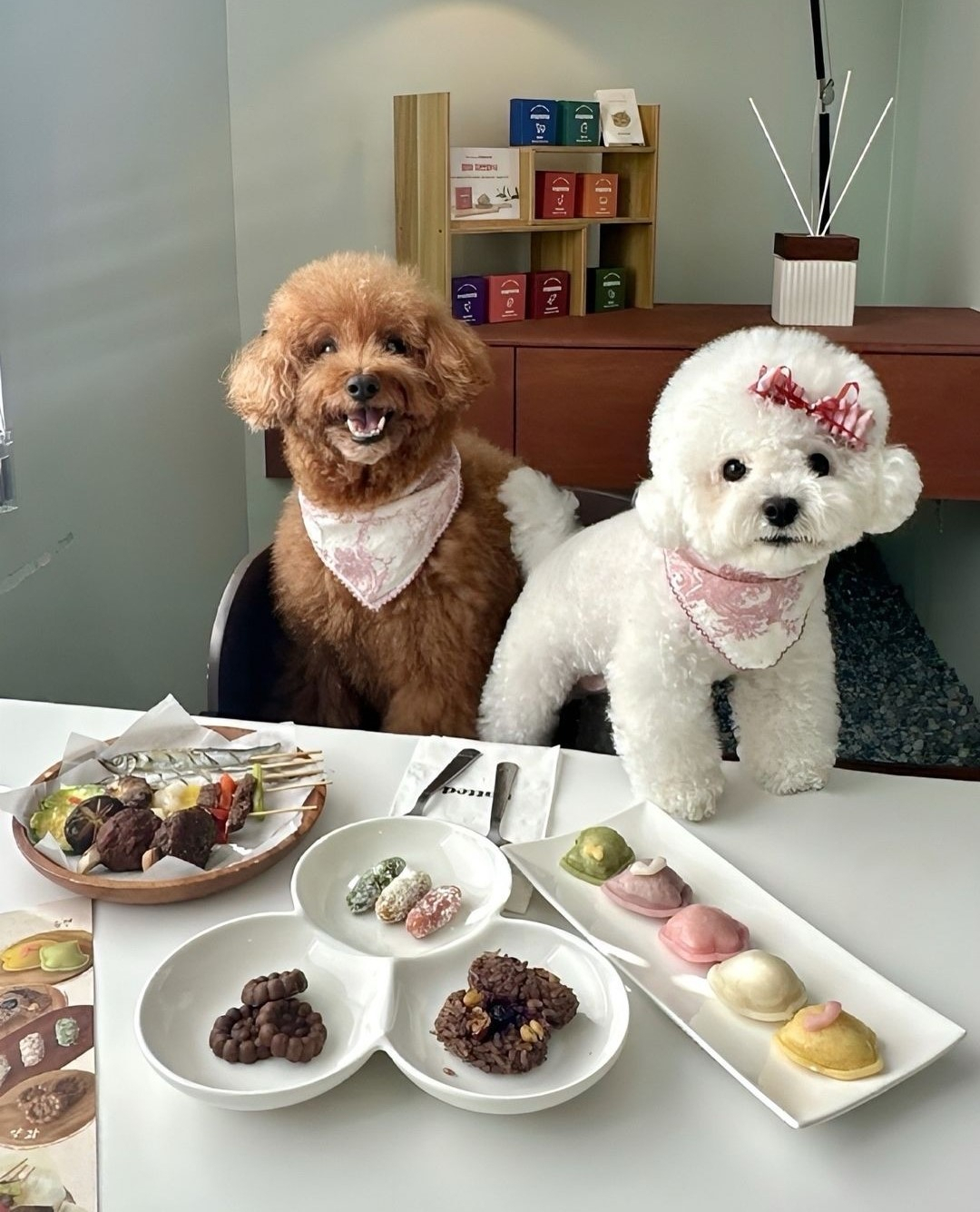 |
A dog in cafe Beryl Kiki in Pohang, North Gyeongsang Province which earned regulatory sandbox permits to allow pets in their establishment (Beryl Kiki's Instagram account) |
Cho, a 31-year-old cafe owner in Seoul who requested anonymity, used to run a popular spot for pet owners.
Her cafe, known for its dog-friendly atmosphere and puppuccinos, a drink for dogs, regularly welcomed customers with their pets. Occasionally, she would bring her own dog to work.
But recent government warnings have made it difficult to allow dogs on the premises.
“I received a warning from the government about having dogs here,” Cho said. “They told me a complaint was filed, claiming the cafe was unhygienic because of the dogs.”
Cho said most pet-friendly cafes and restaurants operate unaware of the ban on allowing pets on their premises. She added that owners typically become aware of the regulation when a civil complaint is filed.
Current laws prohibit pets from entering food-handling establishments such as restaurants and cafes. The ban applies to animals in crates and strollers and includes outdoor seating areas that are registered as part of the business.
Businesses receive a warning for a first offense. A second violation results in a 15-day suspension, and a third incurs a 30-day suspension. A fourth violation or more can lead to a 60-day suspension, revocation of the operating permit, or even an administrative order to close the business.
Pet owners say the rule is out of sync with current trends in S. Korea.
Nearly a quarter of the country’s population, about 15 million people, are pet owners and the country is witnessing a surge in pet-friendly services, particularly in dining and traveling, they pointed out.
Park Hee-jung, 31, who owns a 10-year-old golden retriever, expressed frustration with the inconsistent pet policies at restaurants.
“I’ve had several experiences where I went to a restaurant based on reviews saying it was pet-friendly, only to find they had changed their policy,” she said, adding that she hopes the law will evolve to offer more options and clearer guidelines.
“Different restaurants have different rules, and they usually don’t state them clearly. It’s very confusing and challenging to find a place where I can dine with my dog in peace,” Park added.
In response to growing demand for pet-friendly dining, the government launched a two-year pilot project in December 2022 to explore regulatory sandbox permits for some restaurants and cafes.
“As of July 2024, 141 stores from 38 brands are legally registered as pet-friendly," said Jung In-kwon, a Ministry of Food and Drug Safety official.
Seo Yul-hee, the owner of cafe Beryl Kiki in Pohang, North Gyeongsang Province, is one of them.
"There are agencies that charge around 3 to 5 million won for assistance (in obtaining the sandbox permit)," Seo said, who handled the application process on her own.
She said that while it requires some effort, such as renovating the store, it's manageable. "It's not a walk in the park, but with proper preparation, it's achievable for a business owner."
Establishments with permits must follow a set of guidelines from the Ministry of Food and Drug Safety, such as posting signs that pets are allowed, ensuring dogs are leashed, and covering food when served or displayed. Permits are valid for two years.
Information on pet-friendly establishments with the permit is available on the government’s Regulatory Information Portal.
Seo believes many businesses are simply unaware of the permit.
She also advocates for a change in the law, suggesting that restaurants should be allowed to accommodate pets if their staff completes requirements like hygiene training, rather than enforcing an outright ban.
As the pilot program on pet-friendly dining nears its conclusion, the Ministry of Food and Drug Safety is studying possible revisions of the current regulations, with December 2025 set as its initial timeline for any changes.
 |
Dogs in cafe Patted in Seoul, which earned regulatory sandbox permits to allow dogs in their establishment (Patted’s Instagram account) |
“We will assess the pilot project’s results and gather expert opinions first,” Jung added.
However, there are some who do not support the idea of pets in restaurants and cafes.
“I think small dogs are cute, but imagining their fur and dust in my food puts me off. If a restaurant is pet-friendly, I wouldn’t go,” said Yoon Hye-jung, a 33-year-old Seoul resident.
“I think outdoor seating at cafes is fine for dogs, but I believe many people would feel uncomfortable with dogs inside restaurants,” added Kim Hyo-jin, a 30-year-old owner of Maltipoo, a small mixed-breed poodle. “Besides there could be people who are allergic to dogs or cats.”
Veterinarian Choi In-young, a director at the Seoul Veterinary Medical Association, believes pet-friendly restaurants are necessary but should follow specific legal guidelines.
“There should be designated areas for pets, and shop owners must inform customers in advance,” he said. “The interior and equipment should be designed to prevent food contamination from pet fur.”
Choi also emphasized that pet owners need to take responsibility.
“If your pet hasn’t been taught basic etiquette, like not barking or biting, you may need to sign a waiver. Shop owners should have the right to ask disruptive customers to leave,” he added.




![[Exclusive] Hyundai Mobis eyes closer ties with BYD](http://res.heraldm.com/phpwas/restmb_idxmake.php?idx=644&simg=/content/image/2024/11/25/20241125050044_0.jpg)
![[Herald Review] 'Gangnam B-Side' combines social realism with masterful suspense, performance](http://res.heraldm.com/phpwas/restmb_idxmake.php?idx=644&simg=/content/image/2024/11/25/20241125050072_0.jpg)

